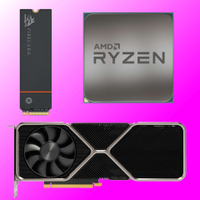Asus is creating the VR 'gaming headset of the next generation' built on Meta's Horizon OS lifted off the Quest 3
An ROG branded virtual reality headset built on Meta's OS? This I have to see, though we don't know much about it yet.

The operating system powering Meta's Quest headsets is going to be released to third-party hardware makers. The newly-named Meta Horizon OS is built on the foundations laid for today's most popular VR headsets, and includes new tools and frameworks for utilising features we've come to expect from Quest headsets into new, original designs.
And if you're wondering who's signed up to make a brand new Horizon OS-powered headset, Asus and Lenovo are already onboard.
So, what's included in Meta Horizon OS? Just about everything embedded into the software of the popular Quest 3, including inside-out tracking, high-resolution passthrough and Spatial Anchors, which are a way for Meta's Quest headset to 'lock-in' on real-world reference points. Whether access to these features in the OS translates into new headsets with specifications and features to match the Quest 3 will depend on how other manufacturers set up their own devices, however.
Asus has plans to produce an ROG branded VR headset. It will focus on gaming performance, and that's pretty much everything we can say about it right now. Well, except that it will utilise the new Meta Horizon OS to some degree, and that it will likely be built using Qualcomm's Snapdragon XR2 Gen 2 processor. As Meta says in a press release: "All of these devices will benefit from our long-term collaboration with Qualcomm Technologies, Inc., which builds the Snapdragon processors that are tightly integrated with our software and hardware stacks."
Essentially, this OS is built for Qualcomm's own brand of Arm chip. Though, as is the case with the Quest line-up from Meta and as mentioned in Meta's press release, we should expect full support on PC including via SteamVR.
How this new ROG VR headset will look is anyone's guess. Though if you were to picture a beefed up Quest 3 with more angular styling and RGB lighting, you're probably not too far off the end product. That's entirely speculation on my part, however.
A post shared by Mark Zuckerberg (@zuck)
A photo posted by on
"We’ve been inspired by the incredible gaming community that has formed around virtual and mixed reality, and we know that the most passionate gamers want high-performance hardware," says S.Y Hsu, co-CEO of Asus. "With Meta Horizon OS, Asus and Republic of Gamers will build the gaming headset of the next generation."
The biggest gaming news, reviews and hardware deals
Keep up to date with the most important stories and the best deals, as picked by the PC Gamer team.
Lenovo's upcoming device is initially less attractive sounding to my gaming headset adorned ears: it's a device primarily billed as being for productivity (yuck), learning (double yuck), and entertainment (sure). Still, with Lenovo's recent good form in gaming laptops and handheld gaming PCs, I'd be keen to see it take a more gaming angle on a VR headset as well.

The important thing is Meta seems to be committed to opening up its VR software to others, which comes at a similar time to Zuckerberg's announcement that it hopes to fund open-source AI as well. This seems like quite the turnaround for a company which had, with the release of the Quest 2, forced a mandatory login onto users. That's gone now, so let's see if other companies can utilise Meta's platform for the best.
Speaking of which, my only initial concern to the new headsets is whether Asus will be able to match Meta on pricing, or whether it would even want to. The Quest 3 isn't as affordable as its predecessor, but it's still quite cheap compared to some VR headsets. I would guess an ROG badge and gaming specific features would jack up the price, which, if I'm honest, is the last thing we really need to bolster player numbers in virtual reality.
Best CPU for gaming: Top chips from Intel and AMD.
Best gaming motherboard: The right boards.
Best graphics card: Your perfect pixel-pusher awaits.
Best SSD for gaming: Get into the game first.

Jacob earned his first byline writing for his own tech blog. From there, he graduated to professionally breaking things as hardware writer at PCGamesN, and would go on to run the team as hardware editor. He joined PC Gamer's top staff as senior hardware editor before becoming managing editor of the hardware team, and you'll now find him reporting on the latest developments in the technology and gaming industries and testing the newest PC components.
Most Popular







